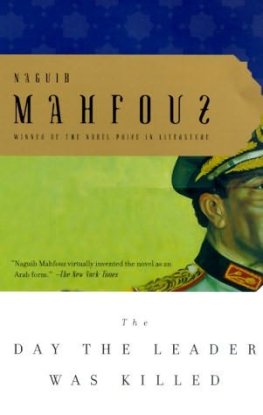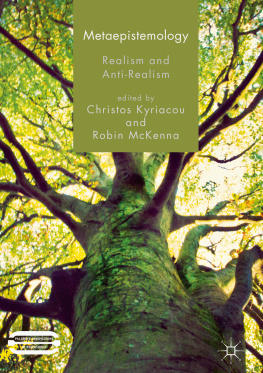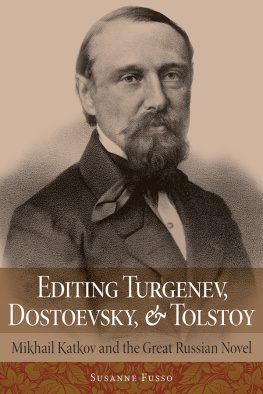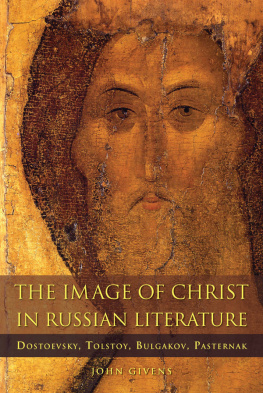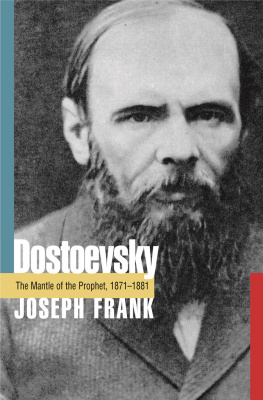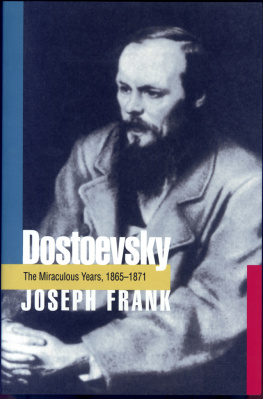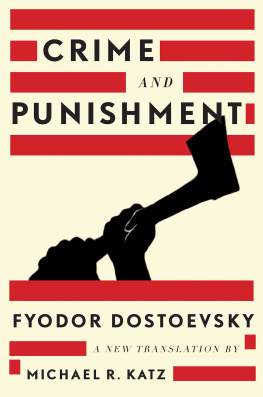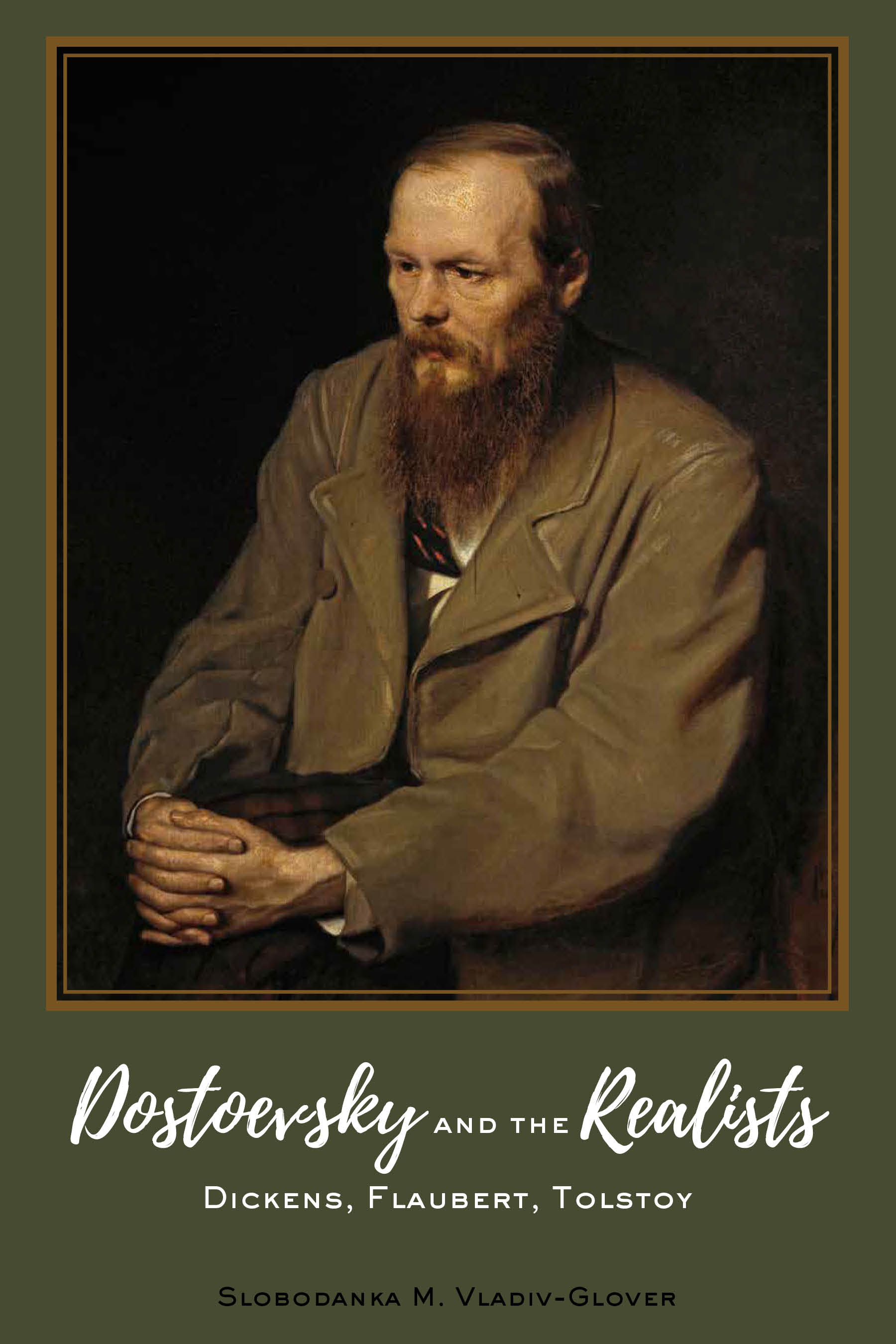This book is part of the Peter Lang Humanities list.
Every volume is peer reviewed and meets
the highest quality standards for content and production.

PETER LANG
New York Bern Berlin
Brussels Vienna Oxford Warsaw
Slobodanka M. Vladiv-Glover
Dostoevsky and the Realists
Dickens, Flaubert, Tolstoy

PETER LANG
New York Bern Berlin
Brussels Vienna Oxford Warsaw
Library of Congress Cataloging-in-Publication Data
Names: Vladiv-Glover, Slobodanka, author.
Title: Dostoevsky and the realists: Dickens, Flaubert, Tolstoy / Slobodanka M. Vladiv-Glover.
Description: New York: Peter Lang, 2019. Includes bibliographical references and index.
Identifiers: LCCN 2018039553 | ISBN 978-1-4331-5223-8 (hardback: alk. paper) ISBN 978-1-4331-5225-2 (ebook pdf)
ISBN 978-1-4331-5226-9 (epub) | ISBN 978-1-4331-5227-6 (mobi)
Subjects: LCSH: Dostoyevsky, Fyodor, 18211881Criticism and interpretation.
Dostoyevsky, Fyodor, 18211881Aesthetics.
Realism in literature.
Manners and customs in literature.
Canon (Literature)History19th century.
Literature and societyEuropeHistory19th century.
Classification: LCC PG3328.Z7 R388 | DDC 891.73/3dc23
LC record available at https://lccn.loc.gov/2018039553
DOI 10.3726/b14603
Bibliographic information published by Die Deutsche Nationalbibliothek . Die Deutsche Nationalbibliothek lists this publication in the Deutsche Nationalbibliografie; detailed bibliographic data are available on the Internet at http://dnb.d-nb.de/.
2019 Peter Lang Publishing, Inc., New York
29 Broadway, 18th floor, New York, NY 10006
www.peterlang.com
All rights reserved.
Reprint or reproduction, even partially, in all forms such as microfilm, xerography, microfiche, microcard, and offset strictly prohibited.
About the author
Slobodanka Vladiv-Glover is Adjunct Associate Professor (Research) in the School of Languages, Literatures, Cultures and Linguistics at Monash University (Melbourne, Australia). She taught in Monashs Slavic Studies and the Centre for Comparative Literature and Cultural Studies until 2013. Apart from Dostoevsky, her research is in the poetics of Modernism and Postmodernism in Russian and Slavic literatures, in the context of European phenomenology and psychoanalytic theory. She is a co-author of Russian Postmodernism: New Perspectives on Post-Soviet Culture (1999 and 2016) with Mikhail Epstein and Alexander Genis. She is on the executive boards of the Australasian Association for Communist and Post-communist Studies (AACPCS) and the North American Serbian Studies Society (NASSS) and is regional representative for Australia of the International Dostoevsky Society (IDS). She is chief editor of The Dostoevsky Journal: A Comparative Literature Review.
About the book
Dostoevsky and the Realists: Dickens, Flaubert, Tolstoy offers a radical redefinition of Realism as a historical phenomenon, grounded in the literary manifestoes of the 1840s in three national literary canons (English, French and Russian) which issue a call to writers to record the manners and mores of their societies for posterity and thus to become local historians. The sketch of manners becomes the instituting genre of Realism but is transformed in the major novels of the Realists into history as genealogy and into a phenomenology of modern subjectivity. Dickens, Flaubert and Tolstoy are brought into relation with Dostoevsky via a shared poetics as well as through a deconstructive and/or psychoanalytic analysis of their respective novels, which are interpreted in the context of various doctrines of Beauty, including Dostoevskys own artistic credo of 1860. In this broad context of European aesthetics and the European literary canon, Dostoevskys own view of history is illuminated in a new perspective, in which his concept of the soil is stripped of its conservative mask behind which emerges a (post-exile) Dostoevsky with socialist, pan-European views. The portrait of Dostoevsky which thus emerges from the present study is that of a European writer with a radically modern aesthetics and with a progressivist political orientation which is in consonance with his pre-exile affiliation with utopian socialism.
This eBook can be cited
This edition of the eBook can be cited. To enable this we have marked the start and end of a page. In cases where a word straddles a page break, the marker is placed inside the word at exactly the same position as in the physical book. This means that occasionally a word might be bifurcated by this marker.
xi
In the writing of this book, I was assisted by discussions with colleagues from Hungary and New Zealand, Dr Gza S. Horvth (Pzmny Pter Catholic University) and Dr Irene Zohrab (Victoria University of Wellington), whose feedback on my Dostoevsky research and encouragement was invaluable. I also wish to thank the Ada Booth Slavic Librarian at Monash University, Ms Anna Rubinowski for assisting with my library requests. I would like to express my debt to my University of Melbourne mentor, the late Dr Dmitry Vladimirovich Grishin, whose work on the young Dostoevsky still informs my own research, as well as to Professor Wolf Schmid (Hamburg University), who offered encouraging comments at the Bakhtin 120 Conference (Vezsprem, 2015). I also wish to thank my student, Dr Lara Jakica, for helping with the bibliography. Finally, I owe thanks to Meagan Simpson, the Commissioning Editor of Peter Lang Publishing (NY), for her systematic support of this project. xi | xii xii | 1
Dostoevsky and the Realists:
Dickens, Flaubert, Tolstoy
Denn dies Innerliche ist glaichfalls, wie die Bilder der Aussendinge, ein im Bewusstsein Vorhandenes und geht in seiner Unabhngigkeit von dem usserlichen von sich selbst aus. Ist nun die Bedeutung in dieser Weise das Anfangende, so erscheint der Ausdruck, die Realitt, als das Mittel, das aus der konkreten Welt herbeigenommen wird, um die Bedeuting als den abstrakten Inhalt vorstellig, anschaulich und sinnlich zu machen.
G. W. F. Hegel, Vorlesungen ber die sthetik I
Theoretical Preliminaries
This book offers a view of Dostoevskys literary procd in the context of his literary age, in an environment constituted by major writers and critics of the 18 th and 19 th centuries, who radically transformed European aesthetics: de Sade with his transgressive prose, Baudelaire with his doctrine of Beauty, Dickens, Flaubert and Tolstoy as painters of modern life in a new registerthat of the unconscious. Dostoevsky was familiar with all of them, they were part of his intellectual baggage; some of them were his literary models. They illuminate Dostoevskys poetics which was forged not in isolation from the European literary tradition, in some unique Russian cultural space, projecting a Russian soul, but in the thick of European ideas and cultural events, to which he was a wit 1 | Realism as defined by means of a phenomenological analysis of the four RealistsDostoevsky, Dickens, Flaubert and Tolstoyis the mode of representation of this modernity. This mode comes to expression as a poeticsthe poetics of Realismwhich, like any poetics since Aristotle, is a historically grounded phenomenon: it is associated with a time and a place, or several places, and an expressed view by its progenitorsthe writers and critics of the dayof what they envisaged as its method and truth.


